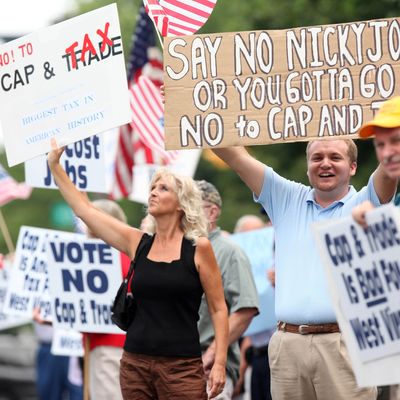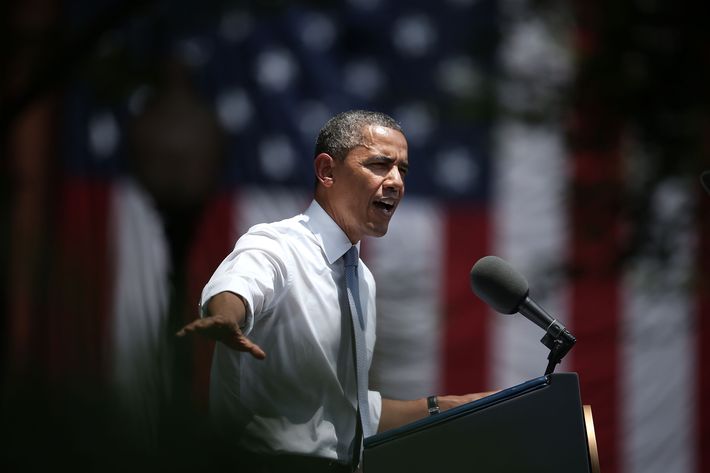
As scientists have grown more certain about the theory of anthropogenic global warming, Republicans have grown increasingly skeptical of it. This strange and dangerous paradox has fascinated experts in a number of fields, including political psychology. Jesse Singal has a compelling, well-reported piece running through the efforts of experts in this field to craft messages that break through conservatives’ natural skepticism.
I think he is correct to treat Republican climate skepticism as essentially a pathology rather than a rational analysis of scientific evidence, and also correct that political psychology plays an important role in solving the problem. But I think he has mislocated the primary source of the pathology.
The premise of the social psychologists is that conservative voters reject climate science because they think differently than liberals. To reach them, climate scientists need to frame the problem in ways aligning with conservative values.
The political psychologists point to ads that try this tactic. He describes them like so:
[C]limate change is viewed as a challenge to a great country, yes, but also an opportunity to profit, to save money, to compete with China. And, crucially, the messengers aren’t environmentalists or easily identified “activists,” but instead are folks who fit into a conservative view of patriotism and hard work (“military, farmers, Midwesterners, people living in rural areas,” as Feygina put it).
Politicians working to limit climate change already do this. Take President Obama’s biggest speech on climate change, which contains every trope described above. There’s the opportunity to profit:
[M]ore than 500 businesses, including giants like GM and Nike, issued a Climate Declaration, calling action on climate change “one of the great economic opportunities of the 21st century.” Walmart is working to cut its carbon pollution by 20 percent and transition completely to renewable energy …
A low-carbon, clean energy economy can be an engine of growth for decades to come.
… to save money:
We waste less energy, which saves you money at the pump and in your pocketbooks.
… to compete with China:
And countries like China and Germany are going all in in the race for clean energy. I believe Americans build things better than anybody else. I want America to win that race, but we can’t win it if we’re not in it.
… and citations of farmers:
Midwest farms were parched by the worst drought since the Dust Bowl, and then drenched by the wettest spring on record …
Farmers see crops wilted one year, washed away the next.
… and the military:
The Department of Defense — the biggest energy consumer in America — will install 3 gigawatts of renewable power on its bases, generating about the same amount of electricity each year as you’d get from burning 3 million tons of coal.
Now, of course, Obama himself is not a soldier or a farmer. (He is a Midwesterner, but not the kind they have in mind.) But if you scroll through the television ads running on behalf of clean-energy advocates, you’ll see plenty of military, farmers, and Midwesterners.
None of this has had a noticeably positive effect. That is because the premise that voters simply follow their moral intuitions is mistaken. A large pile of research suggests that, rather than reason from their values to the issues to their voting decisions, they reason from their values to their voting decisions to the issues. They follow cues from Party elites, whose positions they trust and emulate (or distrust and oppose). A significant portion of African-Americans opposed legalizing gay marriage until President Obama declared his support for it in 2012, leading many of them to quickly change their minds. Paradoxically, the most educated Republican voters are also the most likely to reject the findings of climate science. Why? Because the most educated Republicans are the ones who spend the most time following the news, where they learn the arguments of the Republican elites they trust.

And Republican elites have rapidly lurched to the right. Toward the end of the Bush administration, glimmers of reasonableness could be detected. Bush’s treasury secretary, Hank Paulson, endorsed steps to limit greenhouse-gas emissions. (He still favors them.) John McCain endorsed cap and trade in 2008.
But the green shoots have mostly been stamped out. Chris Christie — the most centrist potential 2016 candidate — pulled his state out of the Regional Greenhouse Gas Initiative and refuses to reconsider, despite its success. The manifesto of “reform conservatives,” the intellectual faction trying to pull the Party toward the center on domestic policy, does not even mention climate change.
Republicans have several reasons for their position. One may be their financial support from the fossil fuel industry, which is heavily Republican — especially the Koch brothers, the oil billionaires who have become massive intra-party players and fervently oppose any plan to put a price on carbon emissions. Another, larger one, is ideology: It’s impossible to limit carbon emissions without government action of some kind, so if you’re committed to smaller government, then you will come up with reasons to oppose any plan. A third is partisanship: Republican voters distrust any agreement with Obama, so even Republicans who shared ideological common ground with Obama on climate, like McCain, quickly abandoned their position when he tried to enact it into law. Of course, it is also surely true that Republican elites may be recoiling from climate science for some of the primal reasons Jesse describes.
Jesse argues, “The answer has more to do with psychology than politics.” Solving the dilemma would be much easier were that true.






























